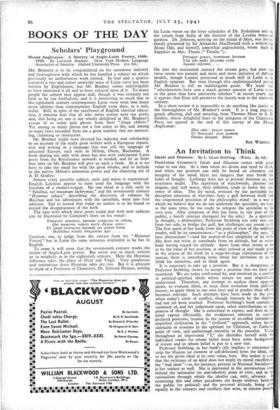BOOKS OF THE DAY
Scholars' Playground
MR. BRAntatt is to be congratulated on the enormous industry and thoroughness with which he has handled a subject on which previously no authoritative work existed. In four and a quarter centuries a vast and rather unwieldy mass of Latin verse has been written by Englishmen, but Mr. Bradner seems indefatigably to have examined it all and to have enjoyed most of it. To many people the subject may appear dull, though it was certainly not held so by our forefathers, and it is interesting to recall that in the eighteenth century contemporary Latin verse went into many more editions than contemporary English verse does, as a rule, today. Still, in spite of the excellence of English classical educa- tion, it remains true that all who wrote poetry were not poets, and, this being so, one is not wholly delighted at Mr. Bradner's rescue of so many pale ghosts from their " longa oblivio." Yet among so many ghosts not a few come to life, and among so many facts recorded there are a great number that are interest-
ing, charming or instructive. • Mr. Bradner might have devoted his industry and scholarship to an account of the really great writers with a European reputa- tion and writing in a language that was still the language of educated Europe, such men as Milton, Owen, Buchanan. A book dealing not only with these but also with continental Latin poets from the Renaissance onwards is needed, and let us hope that later on Mr. Bradner will give us such a book. As it is we have to take the small fry with the great whales, and to include in the survey Milton's enormous power and the charming wit of A. D. Godley.
Almost every possible subject, style and metre is represented. English Latinists appear to have used the language with the freedom of a mother-tongue. No one shied at a title such as " Smithus, vet musarum lachrymae," and the seventeenth century " Hymnus tabaci," describing the discovery of tobacco by Bacchus and his adventures with the cannibals, went into four editions. Sad to record that today no author is to be found to record the disappearance of the herb.
The ease with which these poets could deal with new subjects can be illustrated by Campion's lines on his watch :
Ternporis interpres, parvum congestus in orbem, Qui memores repass nocte dieque sonos : Ut semel instructus iucunde sex quater horas Mobilibus rotulis irrequietus agis .
Crashaw, too, to judge from the extract from his " Hymnus Veneri," has in Latin the same sensuous originality as he has in English.
To some it will seem that the seventeenth century marks the height of Anglo-Latin poetry. But never was so much written or so weightily as in the eighteenth century. Here the Horatian influence takes the place of Ovid and Virgil. Very ponderous and sententious these Horatian odes are, too. But it is pleasant to think of a Professor of Chemistry, Dr. Edward Hannes, writing his Latin verses on the fever schedules of Dr. Sydenham and on the return from India of the director of the Leyden botanical gardens. Dr. Johnson, arriving on the island of Skye, was imme. diately presented by Sir Alexander MacDonald with a welcoming Alcaic Ode, and himself, somewhat ungraciously, wrote back in Sapphics to Mrs. Thrale (" Thralia "):
Pervagor genres, hominum ferorum Vita ubi null° decorata cultu Squalet infortnis . . .
On into the nineteenth century the stream goes, but now the verse seems less natural and more and more imitative of definite models though Landor possessed as much skill in Latin as in English epigram. But even through this undistinguished period Mr. Bradner is still an indefatigable guide. We learn that "schoolmasters have sent a much greater amount of Latin verse to the press than have university scholars" in recent years, and it appears that Eton still preserves the laurels won in the sixteenth century.
In a short review it is impossible to do anything like justice to the thoroughness of Mr. Bradner's work. It is a long pageant, grand, affecting, dull and amusing, from Thomas More to A. D. Godley, whose delightful lines to the delegates of the Clarendon Press are quoted at the end of this survey of the Musae Anglicanae:
Dixi scuis : precor tamen Ut florescant sicut gramen Omnes delegati. Amen.
REX WARNER.


























 Previous page
Previous page